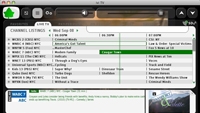Program provider fights to defend its online turf
The professional video industry's #1 source for news, trends and product and tech information. Sign up below.
You are now subscribed
Your newsletter sign-up was successful

Even in the world of content delivery, it's hard to fight the status quo. A Seattle-based online TV provider called ivi TV is feuding with multiple parties in an effort to protect its business model of using a broadband Internet connection to bring TV channels into subscribers’ homes.
The online, multichannel service provides a real-time stream of what's currently on network TV (both East and West Coast), plus numerous foreign-language and specialty channels. For an extra dollar, you can upgrade to the “pro” version that includes DVR-like functionality (pause, rewind, etc.); although, the shows are not stored locally. The service's downloadable app works anywhere there is an Internet connection.
The company said it will provide HD signals in the Chicago, Los Angeles, New York City and Seattle markets in time for this year's Super Bowl and will soon expand its service into Philadelphia (with a 2011 goal to add a new market every 30 days).
Since last year, the nascent service has been fighting with the broadcast industry over copyright infringement concerns. From ivi TV's perspective, it pays broadcasters under the Copyright Act, like 16,000 other cable companies. In addition, fearing its signals might be blocked in the future, ivi TV publicly came out against the Comcast/NBCU merger and filed a complaint with the FCC stating that Comcast was refusing to provide copies of its exclusive agreements with broadcasters.*
“Unlike FilmOn.com, ivi TV is a cable system that pays the U.S. Copyright Office for the legal right to transmit network programming,” said Todd Weaver, CEO of ivi TV. “We look forward to moving this process along and distinguishing our legitimate noninfringing service from illegal ones.”
What's clear is that the broadcast networks (content owners including ABC, CBS, Fox and NBC) are fighting this new generation of media companies, like FilmOn and ivi TV, seeking to circumvent traditional business models by offering programming to Internet users without paying fees to free-to-air channels. Last September, they sued ivi TV and have also blocked videos on their websites from Google’s Google TV.

“It's against the law to steal a broadcast signal and stream it to wireless devices and over the Internet without the copyright owner's permission,” the networks said in a joint statement.
The professional video industry's #1 source for news, trends and product and tech information. Sign up below.
However, ivi TV counters that the Internet has opened up new avenues to consumers and that the TV networks are simply trying to protect their interests. The company has found support among consumer advocacy groups such as Public Knowledge, Electronic Freedom Foundation, Media Access Project and Open Technology Initiative, which all jointly filed an amicus memorandum of law opposing a motion for a temporary restraining order and/or preliminary injunction brought against ivi TV by several big media companies in a New York District Court.
“Any objective analysis makes it clear that the networks are attempting to distort the copyright law to camouflage what are really just anticompetitive attempts at maintaining archaic and legacy business models that ensure consumers have less choice and control,” ivi TV's Weaver said. “The purpose of copyright law is to strike a balance between protecting copyright holders' rights and fostering innovative methods of disseminating the copyrighted works to the public.”
He said that the ivi TV service conforms to “the compulsory licensing provisions of the Copyright Act, which ensures that the networks' statutory copyright protections are maintained while simultaneously offering consumers a revolutionary new method to watch television.”
Hal Bringman, a spokesman for ivi TV said, “Broadcasters are reacting in a knee-jerk manner and suing us the same way they tried to sue away cable television and satellite. It's history repeating itself now that the advent of interactive television is a reality.”
*The networks are also suing FilmOn.com, another live Internet-based service, claiming that FilmOn's model of streaming broadcasts of network affiliates in markets like Los Angeles without compensation also amounts to copyright infringement. The court has granted a temporary restraining order against FilmOn.com while the case goes to trial. A Seattle judge has also dismissed the networks' attempt to connect ivi TV with FilmOn and other Internet-based services.
